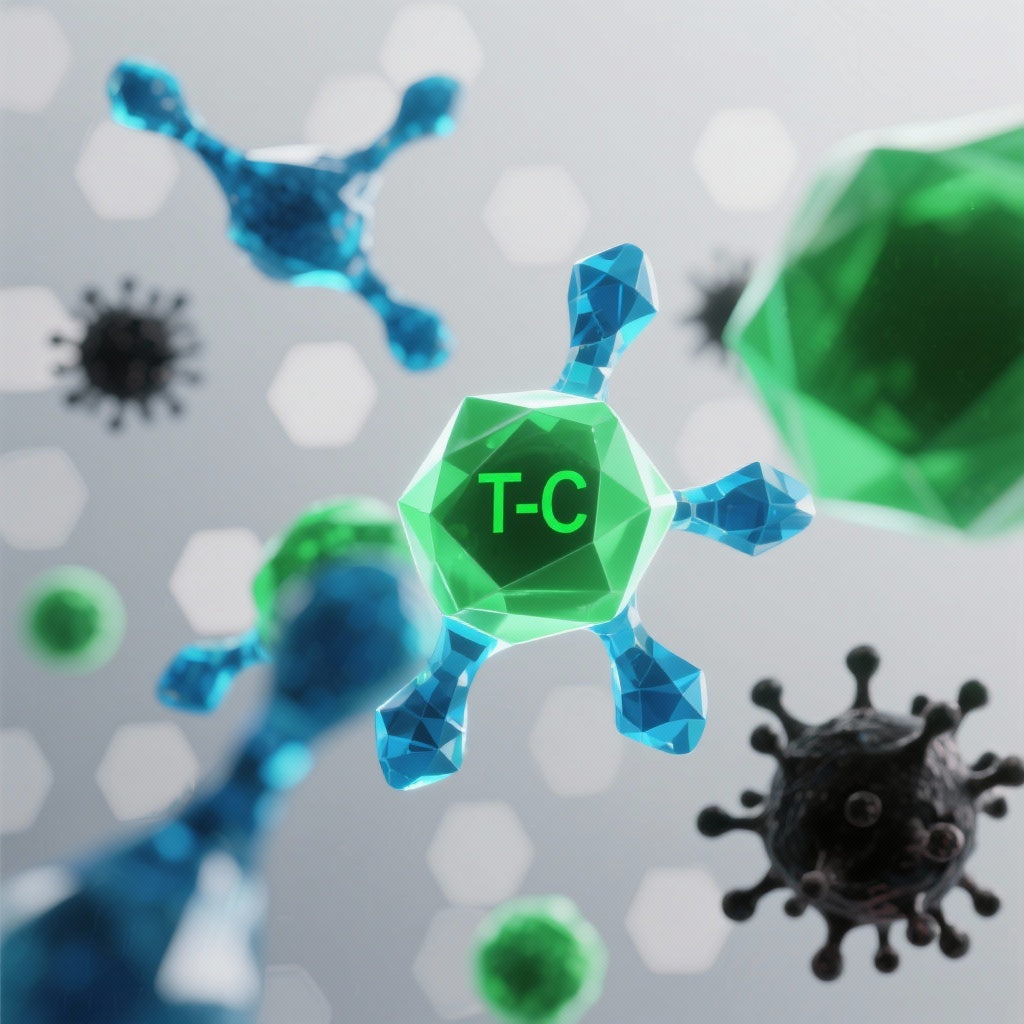Understanding the Immune System: The Complete Beginner's Guide
Introduction
Invisible, silent, and yet it works tirelessly 24 hours a day. Your immune system is arguably the most sophisticated army in the world, a complex network of cells and processes that protects you against a constant onslaught of threats. We only think about it when we get sick, but understanding how it works is the first step to actively taking care of it.
The problem? Its scientific jargon can seem intimidating: lymphocytes, phagocytes, antigens... Enough to discourage even the most curious. This guide aims to demystify this inner guardian. We will break down, simply and clearly, the basics of immunity, introduce its key players, and above all, give you concrete tools to strengthen your natural defenses. Get ready to discover the marvelous mechanism that keeps you healthy.
The Foundations: What is the Immune System?
Imagine your body as a fortress. The immune system is its defense system: the ramparts, the sentinels, and the elite soldiers. It is an incredibly complex network of organs, cells, and proteins that work together to defend the body against foreign invaders, called pathogens (such as bacteria, viruses, fungi, or parasites).
Its most crucial function is its ability to distinguish between "self" (your own healthy cells) and "non-self" (foreign agents or abnormal cells such as cancer cells). Once an intruder is detected, a coordinated response is triggered to neutralize and eliminate it. This continuous monitoring ensures your integrity and survival.
Innate Immunity vs. Acquired Immunity: The Two Branches of Your Army
Your immune system isn't monolithic. It's divided into two main branches, each with a well-defined strategy and role. Understanding this duality is essential to grasping the power of your defenses.
Innate Immunity: The First Line of Rapid Defense
This is your first line of defense, the one you're born with. Innate immunity is non-specific , meaning it doesn't target any particular pathogen. It attacks anything it identifies as foreign. Think of it like the guards posted at the fortress gates. Their response is immediate and general.
The components of innate immunity include:
- Physical barriers: Your skin is the most obvious barrier. The mucus in your respiratory tract traps microbes, and the cilia expel them.
- Chemical barriers: The acidity of your stomach destroys many ingested pathogens, while enzymes present in sweat and tears have antibacterial properties.
- Fever and inflammation: An increase in body temperature (fever) can inhibit the growth of certain microbes. Inflammation (redness, heat, swelling) is a signal that attracts immune cells to the site of infection.
- "Eating" cells (phagocytes): Cells like macrophages and neutrophils patrol your body, ready to engulf and digest any invader.
Acquired (or Adaptive) Immunity: The Intelligent Special Force
If a pathogen manages to breach the first line of defense, acquired immunity takes over. This branch is slower to react the first time, but it is incredibly specific and has a memory . It's your body's special forces unit.
When the immune system encounters an invader for the first time, it learns to recognize it. It then develops tailored weapons (antibodies) and specialized cells to eliminate it. But its greatest asset is its memory. If the same pathogen tries to infect you again, the response will be much faster, stronger, and often so effective that you won't even get sick. Vaccines are based on this principle of immunological memory.
"Immunological memory is one of the cornerstones of long-term health. It is the living library of all the battles your body has won, ready to be consulted in a fraction of a second."
Meet the Soldiers: The Key Cells of Your Defense
The immune system is a matter of cells. White blood cells, or leukocytes, are the true heroes of this story. They are produced in the bone marrow and circulate throughout the body via the blood and lymphatic system, always on the lookout.
White Blood Cells: The Infantry of Your Body
- Phagocytes: The word literally means "eating cells." They are the cleaners and first responders. Macrophages are large cells that devour cellular debris and pathogens, while neutrophils are the most numerous foot soldiers, rushing to sites of infection.
-
Lymphocytes: These are the strategists of acquired immunity.
- B lymphocytes: They are the antibody factories. Each B lymphocyte is programmed to recognize a specific antigen (a molecule on the surface of a pathogen). Once activated, it produces millions of antibodies that bind to the invader to neutralize it.
- T lymphocytes: They have several roles. "Killer" (cytotoxic) T lymphocytes identify and destroy cells in your own body that have been infected by a virus or have become cancerous. "Helper" T lymphocytes are the orchestrators: they coordinate and stimulate the overall immune response, activating B lymphocytes and other cells.
The Lymphoid Organs: Barracks and Command Centers
These cells do not float randomly. They are produced, mature and are stationed in specialized organs called lymphoid organs.
- Primary organs: The bone marrow (where all immune cells are born) and the thymus (where T lymphocytes mature and learn not to attack "self").
- Secondary organs: The spleen (which filters the blood), the lymph nodes (strategic checkpoints where immune cells meet and activate), the tonsils, and Peyer's patches in the intestine.
When the System Goes Out of Control: Allergies and Autoimmune Diseases
Sometimes, this seemingly perfect defense system can make mistakes. Two types of malfunctions are particularly common: allergies and autoimmune diseases.
- Allergies: This is a disproportionate immune reaction to a normally harmless substance, such as pollen, dust mites, or certain foods. The system mistakenly identifies this substance (an allergen) as a threat and triggers an inflammatory response.
- Autoimmune diseases: This is perhaps the most tragic mistake. The immune system loses its ability to distinguish "self" from "non-self" and begins attacking the body's own healthy cells. Rheumatoid arthritis (attack on the joints), type 1 diabetes (attack on the cells of the pancreas), and lupus are examples.
7 Practical Strategies to Boost Your Immunity Naturally
Although your immune system is largely autonomous, your lifestyle has a profound impact on its effectiveness. Rather than seeking a miracle cure, the goal is to adopt healthy habits that provide your immune system with the resources it needs to function optimally.
- Eat a nutrient-rich diet: Your immune cells need fuel. Choose colorful fruits and vegetables, rich in vitamins (C, A, E) and antioxidants. Include sources of zinc (legumes, seeds) and selenium (Brazil nuts), essential minerals for immune function.
- Prioritize restorative sleep: It's while you sleep that your body produces cytokines, proteins crucial for the immune response. Aiming for 7 to 9 hours of sleep per night is one of the most powerful ways to support your defenses.
- Engage in regular physical activity: Moderate exercise, such as brisk walking or cycling, improves blood circulation, allowing immune cells to move more efficiently throughout the body. However, be careful, as overtraining can have the opposite effect.
- Manage your stress: Chronic stress releases cortisol, a hormone that can suppress the effectiveness of the immune system. Practices such as meditation, yoga, mindfulness, or simply spending time in nature can make a real difference.
- Stay well hydrated: Water is essential for the proper functioning of the lymphatic system, a highway for your immune cells. Drink water throughout the day to keep this system flowing smoothly.
- Moderate your alcohol consumption: Excessive alcohol consumption can impair the function of immune cells and make your body more vulnerable to infections.
- Maintain good hygiene: It seems basic, but washing your hands regularly remains one of the best ways to prevent pathogens from entering your body in the first place. It's the simplest and most effective defense.
Frequently Asked Questions (FAQ) about the Immune System
- What is the difference between a virus and a bacterium?
- Bacteria are single-celled living organisms that can reproduce on their own. Many are harmless, or even beneficial. Viruses are much smaller and are not truly "alive"; they need to invade a host cell to replicate. The immune system uses different strategies to fight each of them.
- Are dietary supplements really effective at "boosting" immunity?
- If you have a confirmed deficiency (for example, in vitamin D or zinc), supplementation may be beneficial. However, for a healthy person with a balanced diet, megadoses of vitamins have not been proven effective in "overstimulating" an already functioning immune system. The best approach remains a healthy diet.
- Why do we catch colds more often in winter?
- Several factors are at play. We are spending more time indoors, in confined spaces, which facilitates the transmission of viruses. Cold, dry air can also dry out our nasal mucous membranes, weakening this first line of defense and making it easier for viruses to take hold.
Your Immunity, Your Most Precious Ally
Your immune system is much more than just a defense mechanism; it's an intelligent, adaptive, and resilient system that forms the foundation of your overall health. By understanding its basic principles—from the innate rapid response to acquired specific memory—you are better equipped to become an active partner in your own well-being.
No need for extreme measures. By incorporating small, healthy, and consistent habits, like the ones we've explored, you give your body's internal defenses the best chance to protect you effectively. And you, what's your number one tip for taking care of your immunity every day?
To learn more, check out our guide on essential vitamins for a strong immune system .











